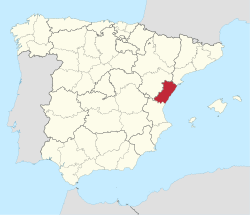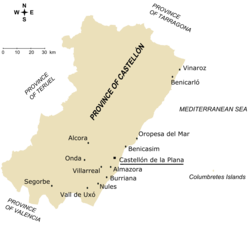Province of Castellón
| Castelló Castelló/Castellón | ||
|---|---|---|
| Province | ||
| ||
 Map of Spain with Castelló highlighted | ||
| Coordinates: 40°10′N 0°10′W / 40.167°N 0.167°WCoordinates: 40°10′N 0°10′W / 40.167°N 0.167°W | ||
| Autonomous community | Valencian Community | |
| Capital | Castelló de la Plana | |
| Government | ||
| • President | Javier Moliner Gargallo (PPCV) | |
| Area | ||
| • Total | 6,679 km2 (2,579 sq mi) | |
| Area rank | Ranked 38th | |
| Population (2014) | ||
| • Total | 587,508 | |
| • Rank | Ranked 28th | |
| • Density | 88/km2 (230/sq mi) | |
| Demonym(s) | Castellonense | |
| Official language(s) | Valencian and Spanish | |
| Parliament | Cortes Generales | |
| Website | Provincial website | |

Castellón (Spanish: [kasteˈʎon]) or Castelló (Valencian: [kasteˈʎo]) is a province in the northern part of the Valencian Community, Spain. It is bordered by the provinces of Valencia to the south, Teruel to the west, Tarragona to the north, and by the Mediterranean Sea to the east.[1] The western side of the province is in the mountainous Sistema Ibérico area.
Castellón's capital is Castellón de la Plana (Catalan: Castelló de la Plana). The province had a population of 501,237 in 2002, 30% of whom were residing in the capital, 60% in its metropolitan area, and 85% along the coastline. As of 2012, the population had since grown to 604,564 people.[2] The province, and in particular its idle large airport, has become a symbol of the wasteful spending and corruption prior to the 2008–13 Spanish financial crisis.
It is a bilingual territory, with many inhabitants speaking both Spanish and the local, co-official language of Valencian. The relation of the latter to the very closely related and mutually understandable Catalan is a source of some controversy.
Other major cities of the province include Vila-real, Borriana, La Vall d'Uixó and Vinaròs. There are 135 municipalities in Castellón; see List of municipalities in Castellón.
Economy
Traditionally, the economy of Castellón has been focused on the production of citrus and vegetables (Nules and Benicarló). Since the 17th century, Castellón has developed an important ceramic and ceramic tile industry (Onda, L'Alcora, Nules, Castellón and Vila-real) and nowadays most of the Spanish tile producers are concentrated in the province. Also, furniture (Benicarló and Vinaròs) and chemical industries (Benicarló and Castellón) are present.
Traditional industries such as shoe and footwear (La Vall d'Uixó), fishing (Castellón, Vinaròs) and textiles (Vilafranca and Morella), have given way to a service-based economy due to the increasing importance of tourism in the economy of the province.
Comarques
The province is historically subdivided into the following comarques:
- L'Alcalatén
- L'Alt Maestrat
- L'Alt Millars / Alto Mijares
- L'Alt Palància
- El Baix Maestrat
- La Plana Alta
- La Plana Baixa
- Els Ports
